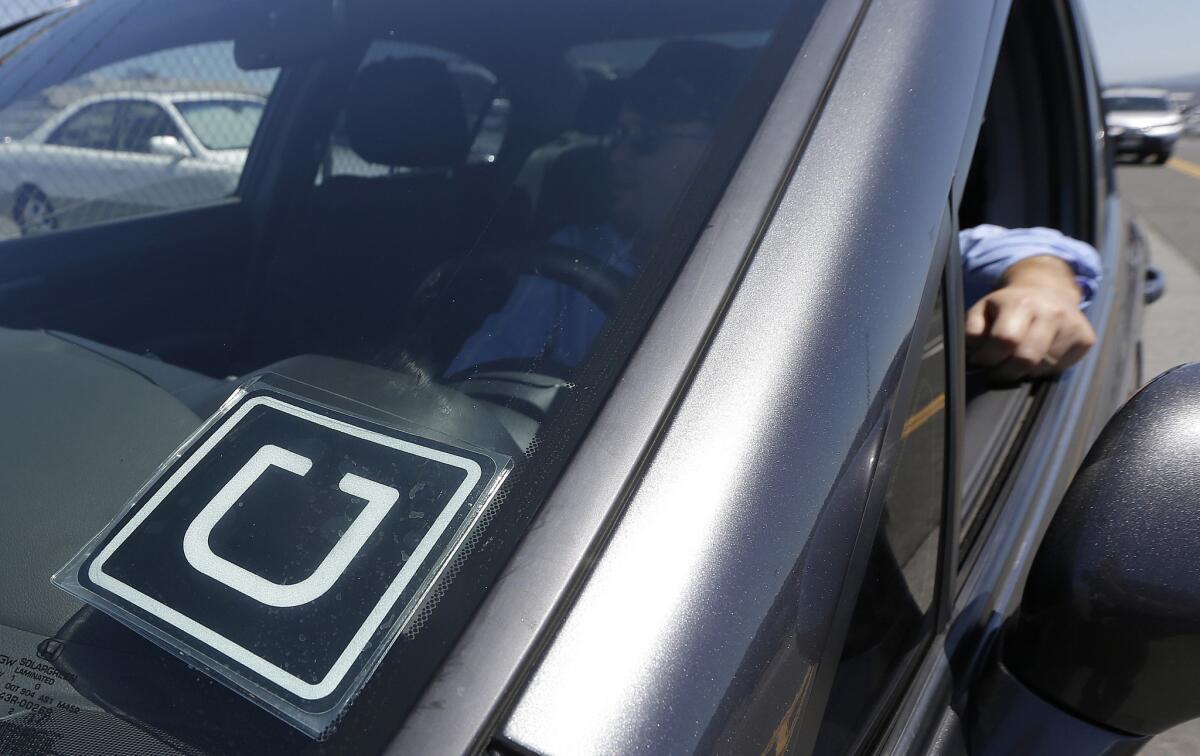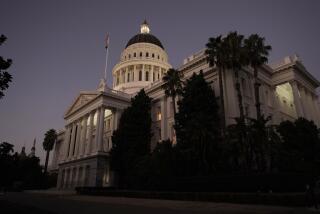How a state senator — whose family is in the taxi business — put the brakes on two Uber bills

In July 2015, Uber driver Karim Amrani sits in his car parked near the San Francisco International Airport parking area.
- Share via
Reporting from Sacramento — San Diego taxi company owner Alfredo Hueso is a frustrated businessman.
State regulations are helping companies like Uber and Lyft rob him of business, he believes. And as he complained in a recent letter to the state Senate president, elected leaders aren’t doing anything to fix the problem.
In that battle, though, Hueso has one advantage over the ridesharing companies: His younger brother is state Sen. Ben Hueso, an important advocate in Sacramento for the taxi industry.
Since his election to the Legislature more than five years ago, the Democratic lawmaker has pushed for stiffer regulation of rideshare companies amid a battle playing out all over the country. At the same time, the burgeoning industry has stepped up its attempt to influence policy in Sacramento.
Discuss this story on our Facebook page >>
Two bills to ease regulations for ridesharing companies passed the Assembly last year, with only a single “No” vote between them. But they have stalled in the Senate’s Energy, Utilities and Communications Committee, where Hueso is chairman.
Hueso has not scheduled votes on either bill, a strategy that’s commonly used in Sacramento to kill legislation.
The senator says that his determination to bring broader regulation to the ridesharing industry is informed by his long history with transportation issues.
“I think mistakes are being made here in the Legislature,” Hueso said in an interview.
Hueso’s familiarity with transportation comes through his family’s taxi business, which has been threatened by the rapid expansion of ridesharing services.
In 1982, Hueso’s father purchased USA Cab, and Ben Hueso, the eighth of nine children, began helping after school with the company while he was in his early adolescence, he said.
Later, Hueso drove for USA Cab and founded a related company with Alfredo and another brother, Jose Antonio, to provide transit services for the handicapped. (With 42 taxis, USA Cab now has the largest fleet in San Diego.)
Hueso said he never had any personal financial interest in USA Cab and sold his share in the related business in the early 2000s, a few years before first winning elected office on San Diego’s City Council.
Hueso was elected to the Assembly in 2010 and won a special election for state Senate less than three years later.
One of the two bills bottled up in Hueso’s committee would formally exempt drivers from companies such as Uber and Lyft from needing commercial license plates, making it easier for people to work for the services and save drivers money.
USA Cab, owned by Hueso’s brothers Alfredo and Jose Antonio, has in fact joined other San Diego taxi businesses in suing the state to force regulators to make rideshare drivers register for those plates.
Ben Hueso said he was not aware of the lawsuit, and that it had no influence on his position on the legislation.
“If you’re going to write a story saying I’m doing this for my brother,” he said, “it’s going to be wrong.”
Three years ago while in the Assembly, Hueso introduced a bill to classify taxi drivers as independent contractors instead of employees of cab companies. The distinction matters because companies generally have to give their employees more generous wages, provide more insurance and meal breaks and allow for easier attempts to unionize among many other work rules.
Hueso has said his bill was motivated by a multi-year lawsuit against his brothers by drivers who argued they should have been treated as employees, not contractors. The bill never went anywhere.
The state Legislature has become a key battleground between the taxi industry and less-regulated rideshare companies. As of last summer, lobbyist spending by Uber alone was in the top 3% of companies and organizations at the Capitol.
The growth of Uber and Lyft has rocketed in recent years and they have taken a chunk of taxis’ market share. As of January 2015, taxi revenue in San Francisco was about $140 million a year while Uber’s in the city was approximately $500 million and growing 200% a year, according to Uber’s CEO.
Last year, after the state Department of Vehicles issued an advisory opinion that rideshare drivers were required to register for commercial license plates, Assemblyman Evan Low (D-Campbell) introduced AB 828 to exempt them. (The advisory opinion has since been withdrawn.)
Around the same time, Assemblyman Phil Ting (D-San Francisco) wrote AB 1360, which would allow rideshare companies to carpool, picking up multiple passengers with different destinations at the same time.
Both bills sailed through the Assembly, but got stuck once they landed in Hueso’s state Senate committee last summer. Hueso said that he wanted to have a comprehensive hearing on rideshare companies before allowing discussion on what he called piecemeal bills. That hearing occurred last month.
During the discussion, Hueso closely questioned ridesharing companies’ representatives, suggesting that Uber and Lyft’s technologies shouldn’t be proprietary because taxi cab meters aren’t. He also expressed frustration that state regulators have been unable to provide strong oversight over the rideshare companies’ drivers.
Robert Callahan, who leads the California branch of the Internet Assn. trade group and is an advocate for both bills, said his organization is disappointed Hueso has yet to put them up for a vote.
“We don’t mind when folks disagree with us,” Callahan said. “We just want to have our day in court, so to speak, and have these bills get an opportunity to be heard.”
Low, who sponsored the bill to exempt ridesharing companies from being required to have commercial plates, declined comment. Ting, sponsor of the carpool legislation, said he endorsed Hueso’s comprehensive approach but was hoping Hueso would schedule a committee vote soon.
“We got zero ‘No’ votes in the Assembly,” Ting said. “We got zero ‘No’ votes in our first Senate committee hearing. I am still very hopeful we can get it through the Legislature this year.”
Hueso said he would schedule both bills for committee discussions, likely in June. That would be less than a month before a deadline to act on the bills, which by that point will have been before his committee for almost a year. He maintains that his push for greater regulation over the ridesharing industry is solely driven by his concern for public safety and consumer protection.
Hueso said his role in the legislative debate was no different from legislators who are farmers or cattle ranchers making decisions on bills for those industries.
“It’s pretty sad to me that you could have a doctor running a bill requiring immunizations that the doctor industry is sponsoring and nobody sees anything wrong with that,” Hueso said. “It can’t be nepotism if what I’m doing is a benefit to the whole society. I’m not doing a specific law just for my brother.”
For his part, Alfredo Hueso said having his brother in the Legislature isn’t helping.
“If you want the truth,” Alfredo Hueso said, “him being there hurts our cause because it looks like he’s doing me a favor.”
San Diego Union-Tribune reporter Kristina Davis contributed to this report.
Follow @dillonliam on Twitter and sign up for the Essential Politics daily newsletter.
ALSO
Uber, Lyft carpooling bill stalls in Senate committee ahead of deadline
LAX becomes largest airport to allow Uber, Lyft pickups
Silicon Valley increasing its lobbying in California Capitol
More to Read
Get the L.A. Times Politics newsletter
Deeply reported insights into legislation, politics and policy from Sacramento, Washington and beyond. In your inbox three times per week.
You may occasionally receive promotional content from the Los Angeles Times.











